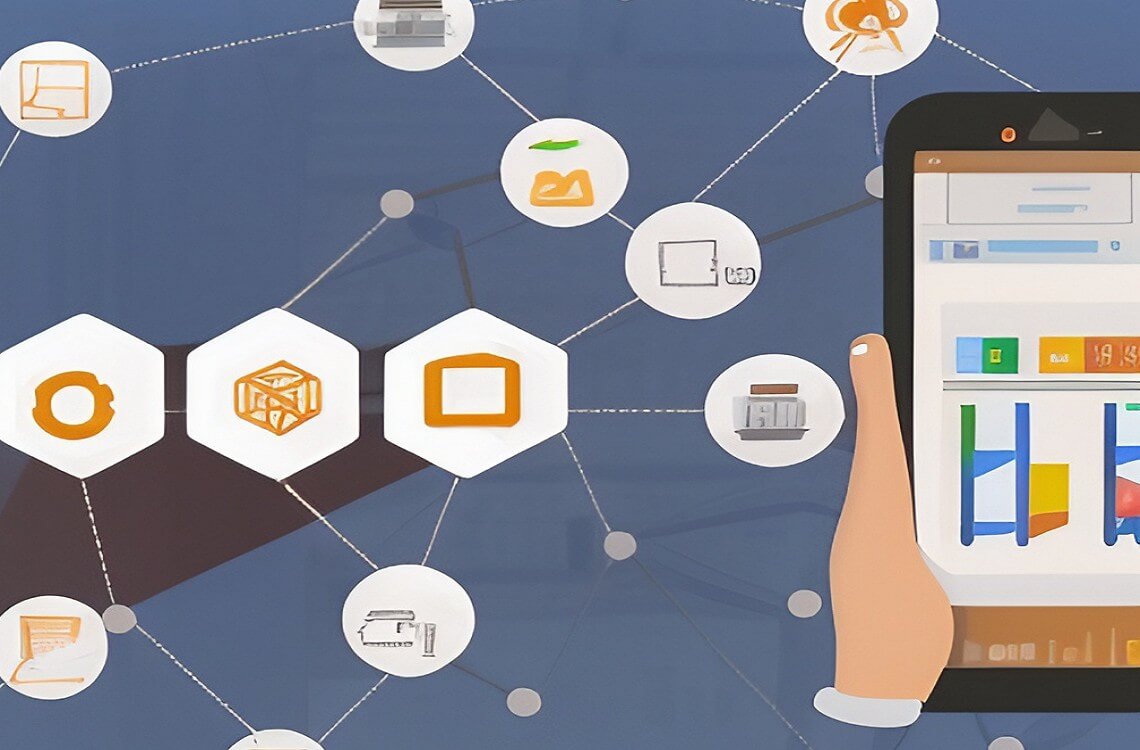Supply chain management (SCM) is one of the most important aspects of any business. It involves planning, maintaining, and controlling the flow of goods, services, and information from source to destination. To make sure that all components are working together efficiently, a comprehensive understanding of all processes in the supply chain is necessary. Unfortunately, the traditional supply chain management process has proven inefficient and costly due to manual labor and complex paperwork. As technology evolves and becomes more accessible, businesses are beginning to explore new solutions that leverage blockchain technology to automate and streamline their SCM operations.
Supply chain challenges
To meet consumers’ expectations, companies must pay close attention to both visibility and disclosure in the supply chain. Visibility involves accurately tracking the data from every stage of the supply chain. Companies need reliable systems to track where their products come from and any changes during transit.
Full disclosure provides much-needed transparency between manufacturers and customers by providing clarity regarding materials used and production methods employed, allowing consumers to make educated purchasing decisions. Organizations should have clear plans to achieve this goal outlining data collection and how and when they should share it.
Another common issue is inefficiency – seemingly simple orders and tasks become complex negotiations or impossible to reconcile when dealing with multiple vendors, suppliers, and logistics companies. The problem can manifest itself in bad upstream inventory management, poor allocation of products to stores, fluctuating demand, slow shelf rotation, and more. When issues arise, product recalls can become an expensive and inconvenient burden that companies must trace to resolve.
How the blockchain works
The Blockchain is an immutable digital ledger that records and stores transaction data in blocks linked together through cryptography.
The blockchain system is decentralized, meaning no single entity controls stored information. Instead, all participants can access this information in real-time without alterations or deletions. As a result, it makes tracking products and their origin more straightforward.
How is the blockchain providing supply chain solutions?
Blockchain technology provides an unprecedented level of security and transparency for transactions. By leveraging immutable distributed ledgers, companies can track a product’s history on its journey through the supply chain.
The information is stored securely and permanently, creating detailed records of when and where the product changed hands. The potential impact this could have on supply chain management performance is far-reaching.
By setting up a shared platform, parties involved in transactions can dramatically improve efficiency by cutting out intermediaries; this reduces the risk of fraud since fewer institutions could potentially obscure records or provide a space for malicious activity. Moreover, extensive records help pinpoint the source of fraud when mistakes occur, further limiting any financial damage resulting from negligence. Blockchain technology is thus an invaluable tool in modern times and has immense potential for businesses seeking to partner with one another.
Utilizing a blockchain-based ledger for shared supply chain data can improve operations’ efficiency and accuracy. By providing a permanent, trusted, and tamperproof audit trail of all activities, companies can safely share relevant information with counterparties from any part of their chain. In addition, this technology allows them to synchronize logistics data, track shipments, and automate payments without necessitating significant revisions to existing systems. As a result, blockchain-powered solutions have established a reliable pathway to reduce costs while enhancing effectiveness and security by streamlining processes along the chain.
Blockchain in supply chain use cases
The introduction of blockchain in the supply chain has enabled many applications. In particular, companies focus on using this technology to improve the traceability and visibility of their products. The distributed ledger allows for a comprehensive view of each item moving along its journey, creating an immutable record that nobody can alter without permission from all stakeholders.
In the logistics and supply chain industry, there are many use cases for blockchain technology; these include:
- PepsiCo’s blockchain pilot, Project Proton, harnessed automated smart contracts to drive efficiency in the company’s programmatic advertising supply chain. These digital agreements could reconcile data from multiple sources and execute payments using digital tokens quickly and securely, resulting in a marked improvement of 28 percent in their processing time. With this successful endeavor, PepsiCo has demonstrated the immense potential for DLT technology to streamline processes and reduce costs for modern businesses.
- Australian car manufacturer Tomcar embraced the use of Bitcoin to pay its suppliers. In addition to eliminating the need for international payment fees, clients in Israel and Taiwan also began submitting payments to Tomcar in Bitcoin. Utilizing Bitcoin is cost-efficient for buyers and sellers, allowing them to easily transact without relying on third-party services such as banks or financial institutions. Furthermore, it enables money to be transferred more securely than other forms of currency. By embracing this technology, Tomcar continues demonstrating its forward-thinking approach to conducting business locally and abroad.
- The use of blockchain technology in the field of food safety provides a tangible and reliable approach to keeping track of food production processes. For example, Walmart utilizes IBM’s blockchain-based Food Trust system to ensure they uphold food safety standards when handling their products. Other well-known companies such as Nestlé, Tyson Foods, Carrefour, and Raw Seafoods have also adopted Food Trust to monitor product routes throughout their supply chains. The benefits of blockchain technology on digital record-keeping are invaluable within the food industry; its transparency allows for better trackability and accountability in monitoring every step of production processes.
- Mining giant BHP is leading the way in digitizing its operations, harnessing the advantages of blockchain technology to streamline its supplier verification processes and ensure that they meet environmental and social standards. The company once made headlines with its successful completion of a $14 million iron ore trade using the MineHub platform, successfully sealed with China Baowu Steel.
- South African paper company Sappi and Indian fabric producer Birla Cellulose created an innovative platform called GreenTrack, allowing for tracking fabric products through multiple stages of production right to their origin in sustainable forests. As a result, major industry players such as Walmart and Marks & Spencer have been able to wield invaluable insight into the sustainability of their product sourcing while increasing transparency, thus assuring customers that fashion comes with minimal environmental impact. Already being utilized by more than 250 supply chain partners, GreenTrack’s success is a testament to the value of cooperation between two leading innovators in pursuit of greener practices.
- Walmart Canada implemented digital ledger technology in the freight supply chain invoice and payment platform to automate their annual shipments. By integrating GPS and IoT-enabled devices, they managed to track more than half a million shipments with remarkable precision. The move translated into a drastic reduction in shipping discrepancies by 97%, bringing renewed accuracy and efficiency to their operations.
- Blockchain technology offered De Beers a new way of tracking diamonds through every production stage, from the mines to the customers. The data gathered from this system allows De Beers to identify potential conflict diamonds and maintain accurate records for all legitimate stones. They also used the technology to reassure customers that the purchased diamond was genuine. Blockchain presents an advanced means of ensuring trustworthiness in a product.
Radio-Frequency Identification (RFID) tags are an efficient way for organizations to automate their supply chain processes and increase transparency. The tags emit electromagnetic waves that can track associated items. Integrating blockchain technology with RFID tags creates a secure, automated system that reduces manual labor and increases accuracy in inventory tracking.
Leveraging blockchain technology combined with smart contracts can revolutionize the industry by creating a high level of compliance and transparency, reducing legal fees and penalties associated with late payments, and curbing counterfeit goods and fraudsters.
Conclusion
The potential of blockchain technology to revolutionize business processes within the supply chain and logistics industry is immense. Its ability to ensure accuracy, transparency, and trustworthiness makes it a powerful tool for companies aiming to enhance their operations. From optimizing inventory management, reducing shipping discrepancies, tracking sustainable resources, and verifying supplier standards, businesses across industries are leveraging the advantages of blockchain technology.
Furthermore, by integrating this technology with other new solutions, such as RFID tags, organizations can create an efficient system that will help them manage their supply chains more effectively while ensuring compliance with current regulations. As such, blockchain presents a viable solution for streamlining operations while increasing productivity and profitability. Ultimately, it has the power to transform the way we do business in the modern era.




